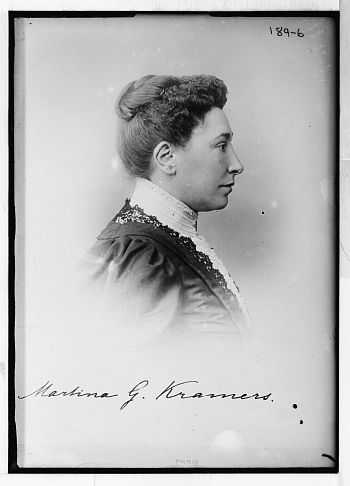CLIO Talks Back

Karen Offen
United States
Archive
- Jun 2011
- May 2011
- Apr 2011
- Mar 2011
- Feb 2011
- Jan 2011
- Dec 2010
- Nov 2010
- Oct 2010
- Sep 2010
- May 2010
- Apr 2010
- Mar 2010
- Feb 2010
- Jan 2010
- Nov 2009
- Oct 2009
- Aug 2009
- Jul 2009
- Jun 2009
- May 2009
- Apr 2009
- Mar 2009
- Feb 2009
- Jan 2009
- Dec 2008
- Nov 2008
- Oct 2008
- Sep 2008
- Aug 2008
- Jul 2008
- Jun 2008
- May 2008
- Apr 2008
I.M.O.W.'s debut blog, Clio Talks Back, will change the way you think about women throughout history! Be informed and transformed by Clio Talks Back, written by the museum's resident historian Karen Offen.
Inspired by Clio, the Greek muse of History, and the museum's global online exhibitions Economica and Women, Power and Politics, Karen takes readers on a journey through time and place where women have shaped and changed our world. You will build your repertoire of rare trivia and conversation starters and occasionally hear from guest bloggers including everyone from leading historians in the field to the historical women themselves.
Read the entries, post a comment, and be inspired to create your own legacies to transform our world.
How long have women been campaigning for equal pay for equal work?
2010-04-01 16:43:53.000
How long have women been campaigning for equal pay for equal work?
Clio finds evidence of this demand for centuries!!! Women in Europe were particularly vocal on the subject, since commercial and industrial development happened there first.
Let?s read the words of a Dutch woman, Martina G. Kramers (1863-1935), a seasoned multilingual activist in the international movement for women?s suffrage and organizer of the ?International Correspondence.?
Below you will find what Kramers wrote about ?equal pay for equal work? in early 1918, at the end of one of the world?s bloodiest and most costly wars.
Due to sustained pressure by feminist lobbyists at the end of the war, the political leaders who negotiated the Treaty of Versailles did include a provision on behalf of equal pay for equal work, and the treaty made specific provision for the inclusion of women in the work of the International Labour Organization and the League of Nations. But it was one thing to put the words into a treaty and another thing to make them a reality ? as we know all too well today. Equal pay for equal work is no April Fool?s joke but an essential requirement enroute to gender equity.
*****
Here is Martina G. Kramers (1918):
?This [equal pay for equal work] is a question of paramount interest for all women, and it is sure to receive the greatest attention from women in governing bodies, and, indeed, from all enfranchised women......
?From the moment women began to take men?s places in industrial work, the question of equal output and equal pay, irrespective of the sex of the worker, has become a burning one. But its solution is beset with great difficulties. First, there is the exact equality of the work, for it is not always as with the work of a tram or ?bus conductor, which is incontestably the same as the man?s whose place the woman has taken; and then there is the desire of the worker herself to be engaged by the employer, which makes her agree to have her output valued less than her predecessor?s for the sake of the paltry wage so sadly needed. There are endless stratagems that make it possible to elude the enforcement of the seeming simple principle, equal pay for equal work.
?In order to have their claim heard and their demand enforced, women workers will have to organise, if possible internationally. But that is no easy thing to do, even if we can have an International Women?s Congress at the conclusion of peace.
?Among the old conventions and ?scraps of paper? turn up by the war, the first that disappeared or were disregarded were the labour laws, limitations of hours, obligations of employers with regard to conditions of labour, etc. With these disappeared the women?s disabilities and restrictions, and in the belligerent countries women flocked to the munition and other trades. It was easy to explain their small salaries by their being untaught and unskilled.
?Now, since 1911, there exists an International Correspondence of women that has for its object the promotion of labour legislation which shall not put more restrictions upon women as compared with men workers than is strictly necessary for the protection of motherhood. At present the writer of this article is its International Secretary, and ten countries have appointed Correspondents. At the outbreak of the war our sphere of action changed, and the majority of the Correspondents with whom we could remain in contact agreed to take up the question of equal pay for equal work. Unfortunately, it is not an easy matter to get exact and exhaustive statistics on women?s work and wages ; only France, Denmark and Switzerland have contributed information. Mme. Duchêne sent a most interesting pamphlet from Paris, stating the wages women got in the first year of the war, when they replaced men, and relating the establishment of a Committee against the Sweating of Women, consisting of six men?s trade unions. In Denmark a State Commission was appointed to deal with the question of a bonus to help men and women State employees through the crisis. From Switzerland we hear than in the tailoring, printing, and metal trades women are paid less than men. In Holland this is also the case, but in general the State awards the same salary to men or women employees, only giving women less chances of advancement.
?The International correspondence received from the Fédération Féministe Universitaire de France a list of resolutions passed by several meetings and unions in many lands, all advocating equal pay irrespective of sex. We are thankful that these show the movement to be an international one; but our object is to obtain statistics as well, and these seem to be difficult to get. The Trade Unions Congress at Berne in 1917, attended only by delegates from the Central and the neutral States, declared itself in favour of equal pay for equal output, which in the case of women may mean longer time.
?Congresses, especially international ones, have power to impose their decisions; our International Correspondence is content to collect information on the subject of equal pay for equal work.?
Source: Martina G. Kramers, ?Equal Pay for Equal Work,? Jus Suffragii: The International Woman Suffrage News, 12:6 (1 March 1918), p. 86.
Further reading: Biografisch Woordenboek van het Socialisme en de Arbeidersbeweging in Nederland, s.v. Kramer, Martina Gezina.


